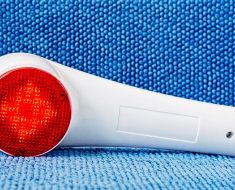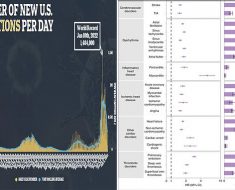
It sounds like an oxymoron, but there are two ambiguities that I’ve always thought were largely certain for most women. We can’t predict when our first period will strike. And we don’t know which one will be our last.
This past winter, however, I changed my mind about the latter statement. I’m fairly positive that I endured my final period, or in medical terms, entered menopause (from menos, month, and pause, to stop), in early March. Said good-bye to Aunt Flo. Checked out of the Red Roof Inn. Watched the Crimson Tide go out for the last time.
I use the word “endured” because it continued for 15 days, which was unusual. Even though I’m over the half-century mark, my menstrual cycle had been as predictable as Gordon Ramsay is with an obscenity. Over the years, the bleeding had gotten a little lighter. But every month, I experienced the same sore breasts, the cramps that twanged like out-of-tune guitar strings, the indignity of an enormous cystic pimple or two (which do not complement crow’s feet at all), and then a very predictable five-day period.
Still, I found this protracted bleeding so out-of-the-ordinary that I eventually confided in a friend. I knew she had been going through perimenopause — when estrogen, progesterone and testosterone plummet like a penny thrown off a skyscraper. “Ah,” she said, nodding wisely. “That’s the last gasp of your uterus.”
At the time, I laughed. My older sister was perhaps just reaching the perimeter of perimenopause, which can last as long as four years. Our mother had gone into menopause, which is largely determined by genetics, later than most women. So naturally, I blamed the extra bleeding on some medication my gastroenterologist had prescribed for gastroparesis and pseudo-constructive bowel disorder, two of the chronic conditions with which I struggle. I invested in the pink tax for a second time. See ya, ten bucks.
But these many months later, I’ve decided that my friend was correct. That last period was like a flash flood of uterine debris removal. I haven’t even spotted since. And looking back, I see now that I had a year or two of perimenopausal symptoms that I blamed instead on my medications or medical conditions: night sweats, loss of sexual desire and insomnia.

How do I know for sure that I’ve reached menopause? I don’t. My menstrual cycle could resume tomorrow. I could have a few eggs still waiting for discharge, lined up like candy bars in a concession machine. According to Dr. Mark Einstein, an OB-GYN at University Hospital in Newark, New Jersey, physicians and medical professionals diagnose menopause as definitive only after your period has quite for 12 months. So technically, like my friend, I am perimenopausal until March 2020. If I don’t get another period by then, I will be officially post-menopausal. In other words, you can’t be in menopause until you’re post-menopausal. Confusing, right? But so accurate for how women are often diagnosed: after the fact.
I could get tested to be reasonably sure. Last October, the FDA approved the PicoAMH Elisa test, which measures the Anti-Müllerian Hormone (AMH) in your blood. These levels serve as an indicator that your ovaries have summited and are ready to belay. But it’s still supposed to be used in conjunction with other tests. Your physician can also measure the levels of the follicle stimulating hormone (FSH) and estrogen in your blood (there’s also a home test). If the former rises as the latter drops, then menopause is likely on the horizon. The North American Menopause Society notes that a salivary swab also measures the decline of hormones, but warns women that this test is both inaccurate and costly.
This hormonal flux is also what produces hot flashes, vaginal dryness, and less lubrication during sex — all symptoms that sucker-punched me this pastMarch, two weeks after my 51st birthday. And according to Dr. Einstein, this I’m smack-dab in the middle of the bell curve. “The average age of menopause in the U.S. is 51, although some women might start sooner and some women start later,”he said. This means, of the approximately 1.3 million women who become menopausal each year, I’m like most of them.

Normal. How I savor that word. Given that I’ve been chronically ill with a variety of immune and autoimmune disorders since I was 24, this might be the first time I’ve been medically average in my entire adult life. Finally, my body is doing something it’s supposed to do: quit working on this thing called fertility.
That doesn’t mean I don’t have symptoms, or won’t have problems to come from being postmenopausal. The hot flashes are no joke; they feel like lightning strikes you in the stomach and tries to exit through the scalp. I’m underweight, so I need to watch out for my bones losing density and becoming brittle (okay, more-so than they already are). On an emotional level, I tear up over the slightest things, which is unlike me. My kids and husband tell me I’m being aggressive and impatient — although that one is like me.
I’m probably even moodier than I would be otherwise, as this year has been one of great personal unsettlement. My younger child graduated from high school and is off to Duke University in a matter of weeks, while my older one enters her senior year at University of Miami. I resigned from my (secure) teaching job to (insecurely) write full-time again. We put our beloved house — built on a mango grove where we’ve lived for almost two decades — on the market, and now we’re in limbo as we wait for it to sell. Of course, I had to go into menopause to complement it all. No doubt the hormonal storm resulting from it is intensifying the very real grief I (am trying not to) feel about empty-nesting, and the conflicted emotions I have about leaving this acre of land that I love so much but can no longer caretake.
But I’m not one to mourn for too long what can’t be changed, especially when it’s a cliché. So instead, I’m discovering some upsides to this peri-post process. No more shredding tampon wrappers in my purses. No more panic about stained skirts and red-striped bedsheets. The biggest and happiest surprise is my complexion, which has plagued me since I’ve been a menstruating teenager. This is also, perhaps, the other reason why I’m convinced that I’m in menopause: I haven’t had a zit since March. Now, inexplicably dewy, I glow, and it could be with gratitude.
This is a sponsored post.
Source: Read Full Article





